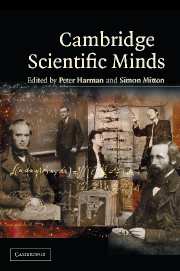Book contents
- Frontmatter
- Contents
- Foreword
- Introduction
- 1 William Gilbert
- 2 William Harvey
- 3 Isaac Newton: Creator of the Cambridge scientific tradition
- 4 William Whewell: A Cambridge historian and philosopher of science
- 5 Adam Sedgwick: A confident mind in turmoil
- 6 Charles Babbage: Science and reform
- 7 Charles Darwin
- 8 Stokes and Kelvin, Cambridge and Glasgow, light and heat
- 9 James Clerk Maxwell
- 10 The duo from Trinity: A.N. Whitehead and Bertrand Russell on the foundations of mathematics, 1895–1925
- 11 Thomson, Rutherford and atomic physics at the Cavendish
- 12 Hopkins and biochemistry
- 13 Charles Sherrington, E.D. Adrian, and Henry Dale: The Cambridge Physiological Laboratory and the physiology of the nervous system
- 14 Hardy and Littlewood
- 15 Arthur Stanley Eddington
- 16 Paul Dirac: A quantum genius
- 17 Alan Turing
- 18 Francis Crick and James Watson
- 19 Mary Cartwright
- 20 Joseph Needham
- 21 Molecular biology in Cambridge
- 22 The discovery of pulsars – prelude and aftermath
- 23 Stephen W. Hawking
13 - Charles Sherrington, E.D. Adrian, and Henry Dale: The Cambridge Physiological Laboratory and the physiology of the nervous system
Published online by Cambridge University Press: 05 June 2014
- Frontmatter
- Contents
- Foreword
- Introduction
- 1 William Gilbert
- 2 William Harvey
- 3 Isaac Newton: Creator of the Cambridge scientific tradition
- 4 William Whewell: A Cambridge historian and philosopher of science
- 5 Adam Sedgwick: A confident mind in turmoil
- 6 Charles Babbage: Science and reform
- 7 Charles Darwin
- 8 Stokes and Kelvin, Cambridge and Glasgow, light and heat
- 9 James Clerk Maxwell
- 10 The duo from Trinity: A.N. Whitehead and Bertrand Russell on the foundations of mathematics, 1895–1925
- 11 Thomson, Rutherford and atomic physics at the Cavendish
- 12 Hopkins and biochemistry
- 13 Charles Sherrington, E.D. Adrian, and Henry Dale: The Cambridge Physiological Laboratory and the physiology of the nervous system
- 14 Hardy and Littlewood
- 15 Arthur Stanley Eddington
- 16 Paul Dirac: A quantum genius
- 17 Alan Turing
- 18 Francis Crick and James Watson
- 19 Mary Cartwright
- 20 Joseph Needham
- 21 Molecular biology in Cambridge
- 22 The discovery of pulsars – prelude and aftermath
- 23 Stephen W. Hawking
Summary
The Cambridge Physiological Laboratory was formally established in 1883 when Michael Foster (1836–1907), then Praelector in Physiology at Trinity College Cambridge, accepted Cambridge University's first Chair of Physiology. From this laboratory emerged several key scientists in the study of the nervous system, principal amongst them being Foster's colleagues J.N. Langley (1852–1925) and Walter Gaskell (1847–1914). Their pupils Charles Sherrington (1857–1952), Henry Dale (1875–1968), and E.D. Adrian (1889–1977) all won Nobel Prizes for elucidating basic mechanisms of the nervous system, each of them making major contributions to modern understanding of the functional mechanisms of the nervous system. In turn, in 1963, two of Adrian–s own pupils Alan Hodgkin (1914–1998) and Andrew Huxley (b.1917) became Nobel laureates in 1963 for their investigations of the molecular mechanisms of neural activity. Also from the Physiological Laboratory in the earlier period came A.V. Hill (1886–1977) who won the Nobel Prize in 1922 for his work on heat generation by nerve and muscle. The physiological research work that Sherrington, Dale, and Adrian undertook, and the lab from which they emerged, in which Langley, Gaskell, Adrian, and Hodgkin spent almost their entire professional careers, will form the main foci of this chapter.
MICHAEL FOSTER AND THE CAMBRIDGE PHYSIOLOGICAL LABORATORY: FEW APPOINTMENTS HAVE MORE PROFOUNDLY INFLUENCED THE FUTURE OF A UNIVERSITY OR A SUBJECT
Michael Foster trained under William Sharpey, the ‘father of British physiology’, at University College London, becoming Professor of Practical Physiology there in 1867.
- Type
- Chapter
- Information
- Cambridge Scientific Minds , pp. 187 - 201Publisher: Cambridge University PressPrint publication year: 2002



